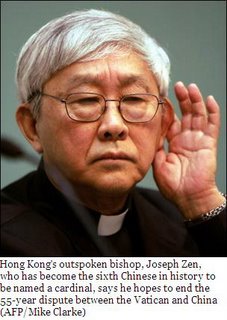 HONG KONG (AFP) - Hong Kong's outspoken bishop, Joseph Zen, who has become the sixth Chinese in history to be named a cardinal, says he hopes to end the 55-year dispute between the Vatican and China.
HONG KONG (AFP) - Hong Kong's outspoken bishop, Joseph Zen, who has become the sixth Chinese in history to be named a cardinal, says he hopes to end the 55-year dispute between the Vatican and China.He said Pope Benedict XVI's decision to choose a Chinese cardinal showed he attached great importance to the millions of Catholics in China.
"This showed that he really values China and I hope we will be able to rebuild the relationship between China and the Vatican," he told reporters.
Relations between China and the Holy See have been strained ever since the communist regime expelled the Vatican's ambassador in 1951, a move that was followed by a cut in diplomatic ties.
Over the past decade, however, the Vatican has attempted to repair ties with Beijing.
The Chinese government has repeatedly said it is willing to improve relations with the Vatican only if it breaks off ties with Taiwan, which Beijing regards as a renegade province, and promises not to interfere in China's internal affairs.
The 74-year-old Shanghai-born bishop said the two conditions could be "easily solved" saying the Holy See was ready to switch diplomatic ties to China from its arch rival Taiwan.
But he said the lack of religious freedom in China made it difficult to improve relations.
"Chinese churches are under a special situation. The Chinese government has the control of the churches and are very strict about what freedom they can have. So the situation is not so simple. We must do this step by step," he said.
"Everyone admits that the situation is not so normal ... The desire for normalisation is on both sides," he said. "I hope there's some normalisation with the situation in China."
Zen said he hoped his new post would give him the opportunity to speak with Chinese leaders.
As head of the 250,000-strong Hong Kong Catholic diocese, Zen has long been a fierce critic of the Chinese government and has often joined in pro-democracy protests in the territory.
He said his new post would not change his stance on his belief.
"People have called me a rebel. If you want to help the disadvantaged, you have to speak louder, otherwise nobody will hear," he said.
Zen was positive that his relationship with China had not been damaged by his critical remarks although he believed China was "watching" his actions.
He would not be drawn on whether he would demand the release of jailed Catholic priests and believers in China.
"I will not raise the questions purposely ... in a high-profile way. We will have to find the best way to reach the best result," he said.
Catholics in China are routinely detained for weeks at a time for inviting friends to worship at home. Priests have been sentenced to years in jail and some have simply disappeared.
According to the US-based Cardinal Kung Foundation, at least 43 underground Catholic bishops, priests and seminarians in China are in prison or labor camps, under arrest warrant and in hiding, or under house arrest.
China's Catholics are divided into two churches -- the government-approved "patriotic" church which does not recognize the authority of the pope, and the underground church whose adherents accept the pontiff as leader in contravention of Chinese law.
The government church has about four million worshippers, according to official figures, while the underground church has about 10 million, based on Vatican estimates.
This Post's Link

No comments:
Post a Comment